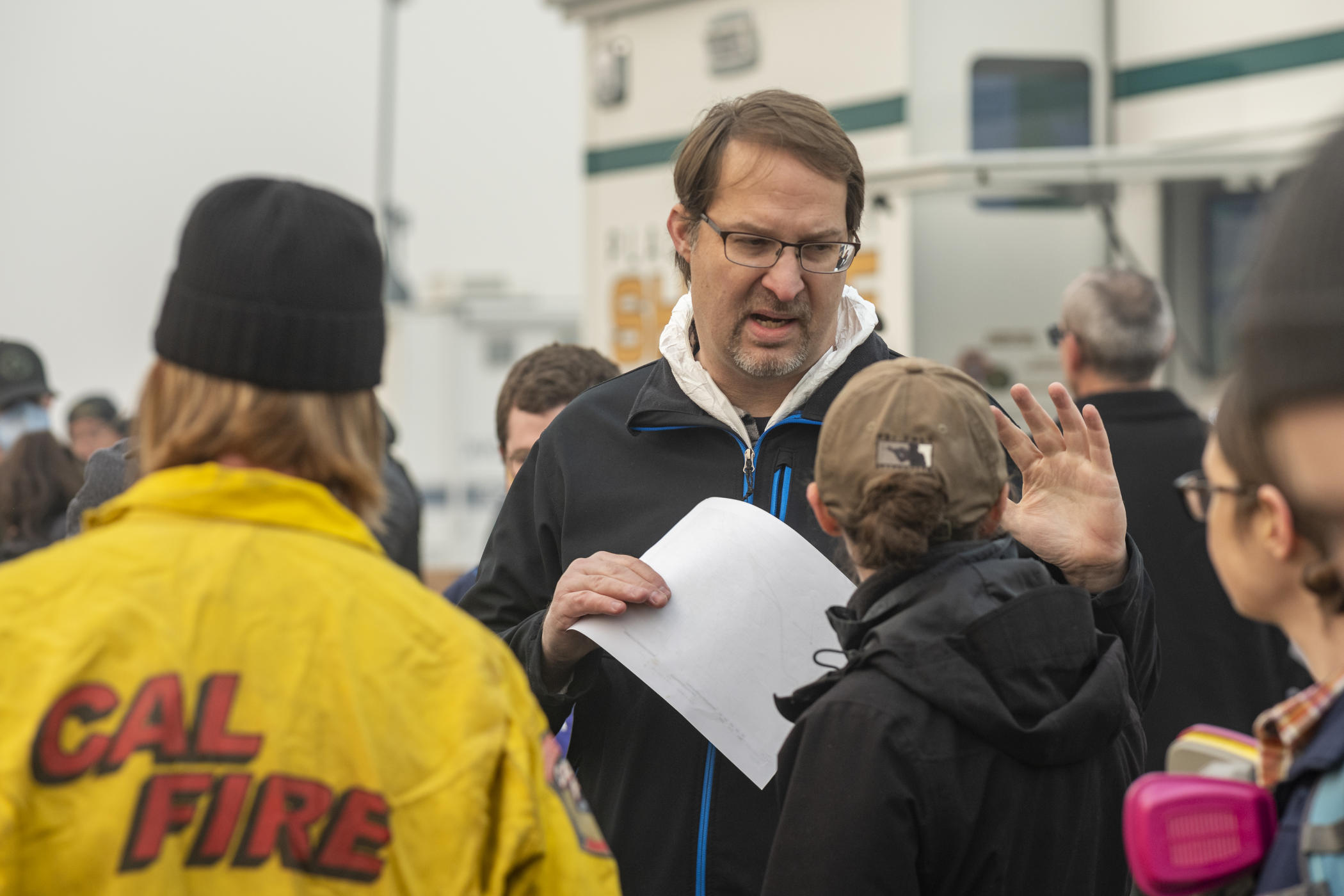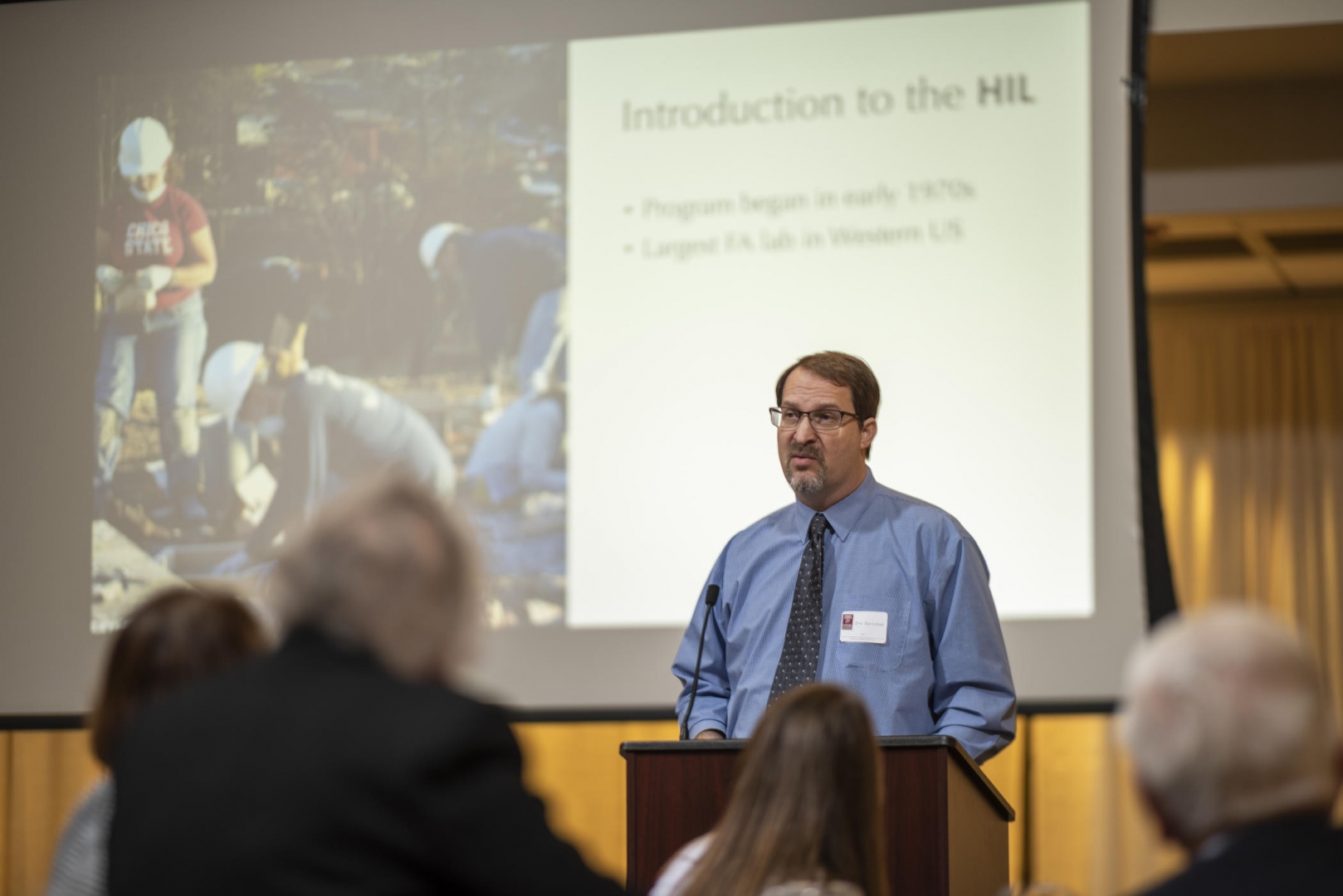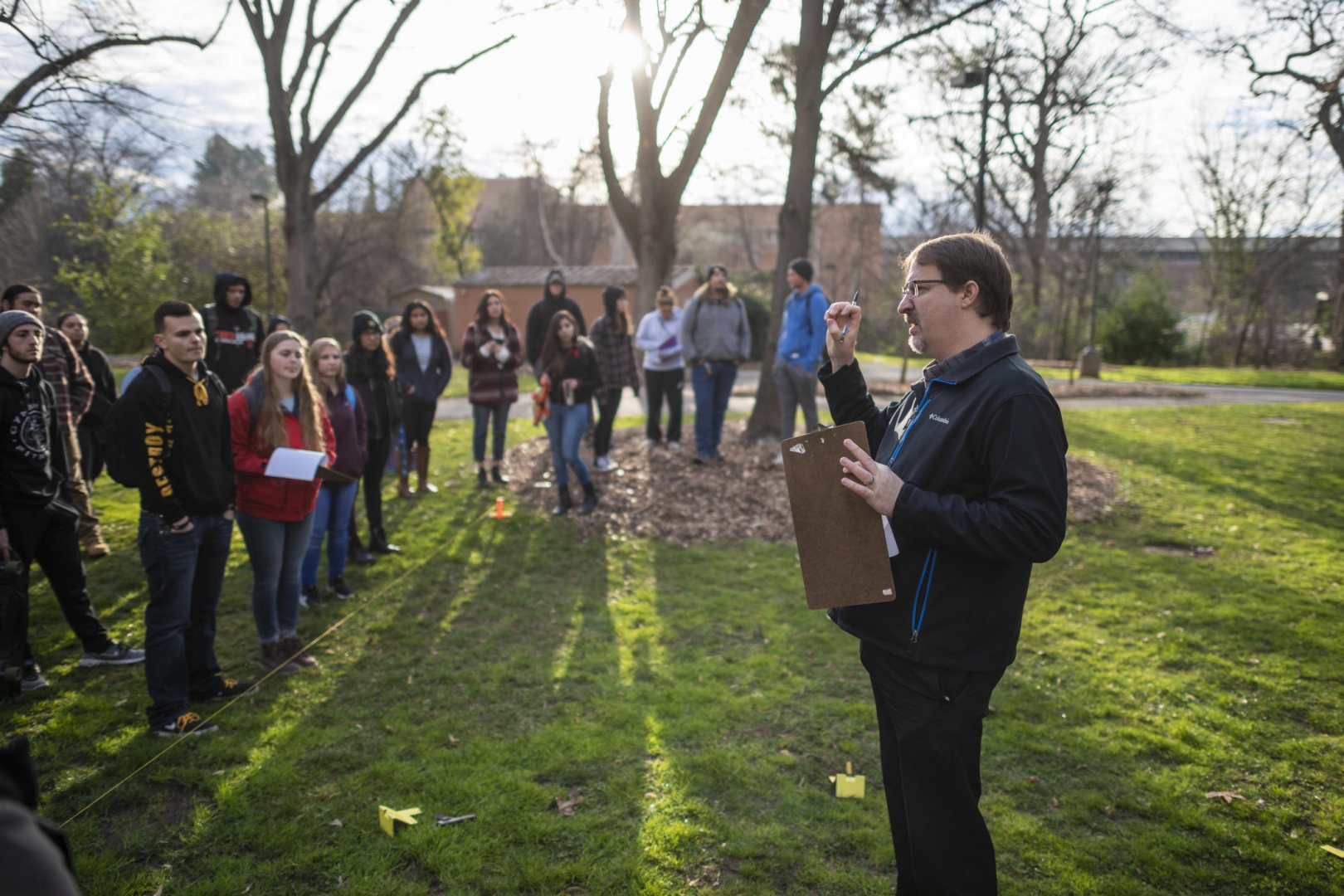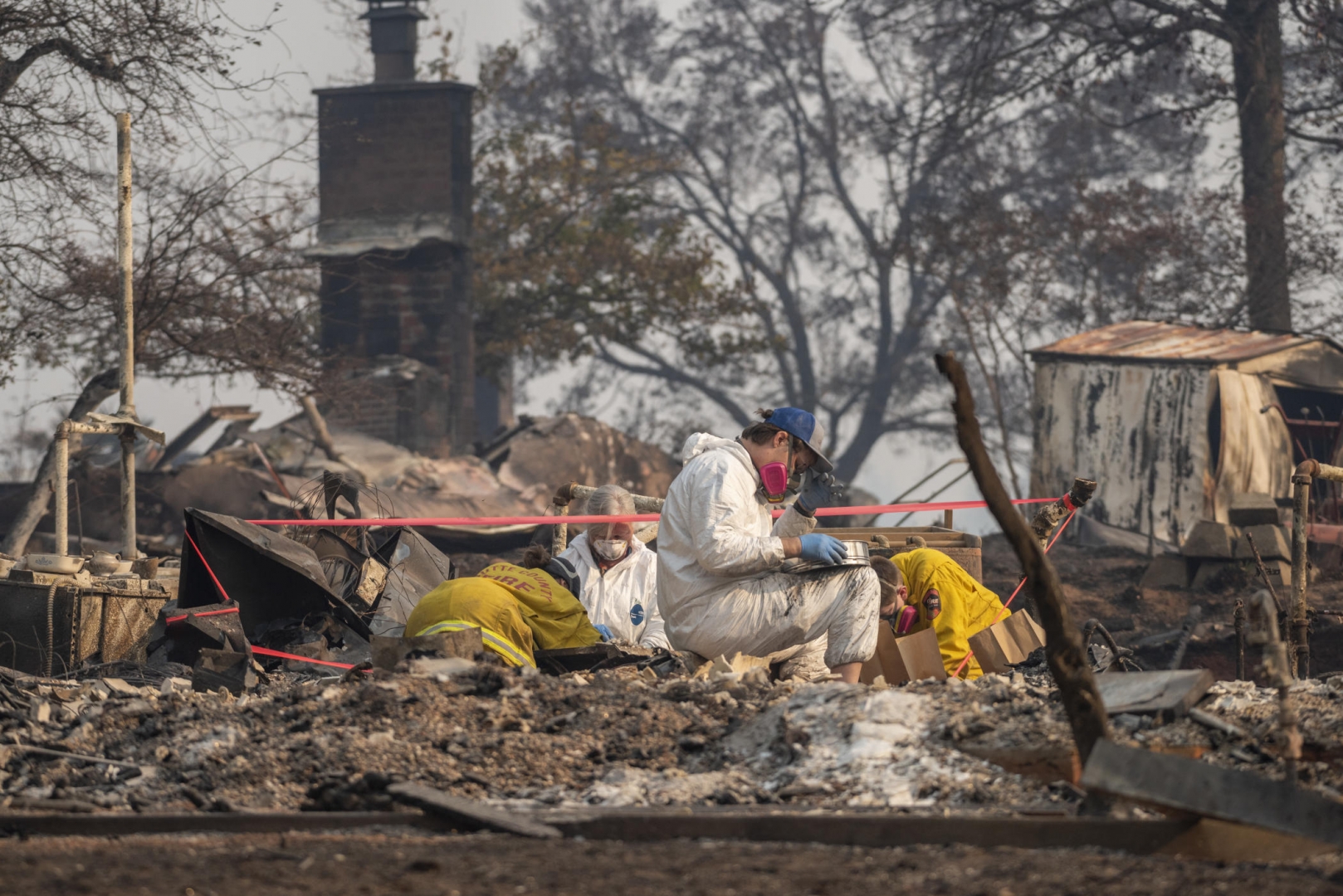Preeminent Anthropologist Earns Honors for Service

Faculty Eric Bartelink (center) talks to a team of Anthropologists that work with the Butte County Sheriff Coroners at the Coroner Incident Command at Butte College to identify human remains consumed by the Camp Fire continues to impact campus carrying heavy smoke over the area on Friday, November 16, 2018 in Oroville, Calif. (Jason Halley/University Photographer/CSU Chico)
He’s helped exhume bodies from the 1995 genocide of more than 8,000 Bosniaks, the worst war crime in Europe since World War II. He’s identified additional missing persons from 9/11, our nation’s largest mass casualty incident. And he’s returned the remains of a victim of two of California’s most notorious serial killers to her family.
But for Professor Eric Bartelink, the work he does day in and day out at Chico State is among the most meaningful—shaping the forensic anthropologists of tomorrow by providing his students practical experience and professional exposure. Also working to improve the science and standardization of his industry, he hopes to advance a field to which he has dedicated his career while encouraging the next generation of collaborators.
“Forensic anthropology is still a relatively new science but has a very bright future with much left to learn,” Bartelink said. “At Chico State, I have had the honor of working with top-notch students who bring new ideas and perspectives to casework and research. The enthusiasm of the students is one of the things that drives me forward.”
This week, the California State University has recognized Bartelink for his extraordinary dedication and exemplary achievement. As a recipient of the Wang Family Excellence Award for Outstanding Faculty Service—one of the most prestigious honors in the 23-campus system—he will be celebrated during a special ceremony Tuesday at the Office of the Chancellor.
“Dr. Bartelink is remarkable—he provides life-changing and career-enhancing learning experiences for his students and contributes truly exceptional service work on behalf of law enforcement agencies throughout the state,” said President Gayle Hutchinson. “While his achievements exemplify both outstanding scholarship and mentorship, his work with students demonstrates Chico State’s commitment to service-learning experiences.”

Bartelink has taught anthropology at Chico State since 2006, when he was hired as faculty and was subsequently put in charge of the Human Identification Laboratory. Despite a lifelong love of science, he admits he didn’t realize he was interested in the “bones” aspect of anthropology until he heard a presentation by a prominent forensic anthropologist during his undergraduate years at Central Michigan University.
“I was blown away,” he said. “I didn’t know you could do that as a career. I was so fascinated by the puzzle-solving that goes into it.”
After earning his BS in anthropology, he enrolled at Chico State for his master’s in anthropology in 1997. Through coursework and mentoring by faculty Turhon Murad and P. Willey, he dove deeper into the world of forensic science. Bartelink remains grateful for the examples they set, partnering with students while also demanding high standards, a model he follows today, especially in providing opportunities to work on real-world cases.
Near the end of his master’s program, he spent the summer of 2000 in Bosnia to exhume mass graves through an internship program with the United Nations International Criminal Tribunal for the Former Yugoslavia, Bosnia-Herzegovina. In not only recovering victims of the Srebrenica massacre but generating evidence that would go on to be used in war crimes courts, he committed himself to a career where the work and expertise is invaluable.
In a PhD program shortly after, Bartelink spent six months in New York identifying remains of victims from the 9/11 terrorism attacks. He was part of a team searching through more than 20,000 pieces of human remains, many of which were commingled, in hopes DNA testing could identify the victims and give their families some closure. He eventually helped put names to several who died and described the experience as “life-changing.”
“I’ve always enjoyed casework,” he said. “We help law enforcement, provide closure to families, and provide information that may be useful for resolving medico-legal cases. It validates what you are doing.”
After completing his PhD at Texas A&M University in 2006, Bartelink returned to Chico as a faculty member, invigorated to not only continue assisting with investigations through the Human Identification Laboratory but also shaping the forensic scientists of tomorrow.

At his core, Bartelink believes deeply in the connection between service work, teaching, and research. He collaborates with his students as peers, supports conference participation, provides connections via his vast cross-disciplinary professional network, and engages them as assistants in his research projects. For example, he’s chaired 22 thesis committees and presented on 117 oral papers or posters at regional national and international conferences, a majority of which included student co-authors. He’s also been awarded more than $890,000 in external grants and $623,000 in internal grants over the past five years at Chico State for his academic research. Students assist in nearly all of them.
Bartelink said he finds great joy in watching students’ excitement, pride, and awe when they are exposed to something for the first time, whether it’s speaking in front of hundreds of people at a conference or assisting on a recovery of human remains with one of the lab’s state or federal partners. He can see the passion spark in their eyes, as it did for him decades ago.
“I’m actually learning things from them, and some of them have far surpassed me in their knowledge of certain areas,” he said.
He knows that once they give a poster presentation, they are more likely to do one again. If they apply for grants, they can persist in similar projects. And if they publish work, they will carry on as co-authors and even as authors themselves. That kind of experience is not only empowering, he said, but it’s critical if students are going on to doctoral programs, where their experience here at Chico State makes them extremely competitive.
Martha Nuño Diaz-Longo (MA, Anthropology, ’17) is among Bartelink’s many former students who credit him for where she is today in her academic career, as she now pursues her PhD at University of California, Berkeley and continues her research into migrant deaths along the US-Mexico border. He is, she said, the most dedicated and selfless professor she has encountered in all of her years of college.
“As a first-generation Mexican-American woman, my path in academia has been one full of trials and tribulations. … Dr. Bartelink has taken the time to understand what is important to me and how I can combine my culture with my career in academia,” she said.
Janet Finlayson (MA, Anthropology, ’14) said that even after she completed her anthropology graduate course work, for which Bartelink was her thesis advisor, he continues to serve in the role of mentor, professional advisor, peer, and collaborator.
“Dr. Bartelink has a rare investment in his students’ professional development that encourages them to be confident, engaged anthropologists,” she said. “Without hesitation, he always finds time to address student’s needs, undeterred by his own busy schedule.”
He admits he can be a bit of a workaholic and likes to “stay busy.” He struggles to turn down opportunities to do research or assist on investigations, in part because he loves the work so much but also because he knows its innate value.
Bartelink is a Diplomate with the American Board of Forensic Anthropology as well as a certified instructor for Peace Officer Standards and Training. From 2015–19, he served as the president of the American Board of Forensic Anthropology, and since 2018 he has been on the board of directors for the American Academy of Forensic Sciences. He’s also a forensic specialist with the National Missing and Unidentified Persons System.
Through work with the Organization of Scientific Area Committees for Forensic Science and the American Board of Forensic Anthropology, he’s also committed to creating best practices for analysis and standardization, to support his profession as a whole.

Through the University’s Human Identification Laboratory, Bartelink and his colleagues are often called by law enforcement agencies to sites at all times of day and night, dispatched to remote hillsides, dark basements, and taped-off crime scenes to assist with recovery of human remains. And in 2018, they helped lead the recovery of victims of the Camp Fire, supervising teams of students, alumni, and faculty from other institutions in the largest search for human remains since 9/11. His experience, in that regard, has come full circle.
All this is done while maintaining a full teaching load and fulfilling his professional roles within the college and department. Bartelink’s service work and professional recognition is, quite simply, astonishing, Hutchinson said. And while search and recovery work is a cornerstone of his service, she noted that it comes without remuneration or payment, other than reimbursement for technical supplies.
The CSU’s Wang Family Excellence Award, which includes a $20,000 prize, follows a number of Chico State awards for Bartelink, including earning Professional Achievement Honors in 2009 and 2017, Outstanding Research Mentor in 2011, and a Research Impact Award in 2016. He was named the David Lantis Endowed University Chair in 2017.


